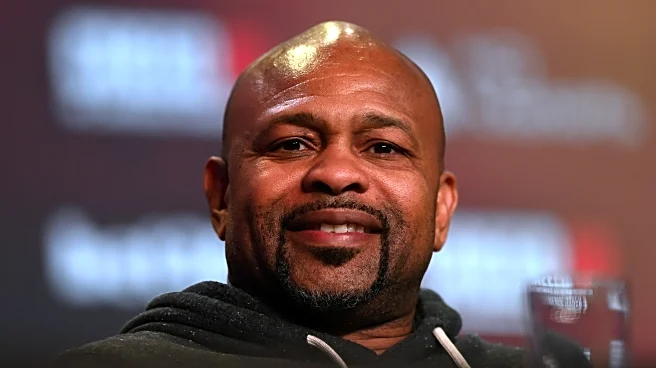What's Happening?
Stephen Colbert opened the 2025 Emmy Awards with a humorous inquiry about job opportunities, referencing the upcoming conclusion of The Late Show With Stephen Colbert. CBS announced the show's termination after the 2025-26 season, citing financial reasons. The Late Show, originally hosted by David Letterman since 1993, has been under Colbert's leadership since 2015. Reports indicate the show incurs a $40 million annual loss for CBS, although some industry insiders dispute this figure. During the Emmys, Colbert humorously offered his resume to Harrison Ford, asking him to pass it to Steven Spielberg. Colbert's show was nominated for best talk series, competing against Jimmy Kimmel Live! and The Daily Show, and ultimately won the award.
Why It's Important?
The end of The Late Show With Stephen Colbert marks a significant shift in late-night television, impacting CBS's programming strategy and potentially altering the landscape of talk shows. The decision reflects broader industry trends where financial viability increasingly dictates content choices. Colbert's departure could lead to changes in viewership dynamics and influence the network's future direction. The show's closure might affect the employment of its staff, highlighting the economic pressures faced by traditional media outlets. Colbert's humorous approach to the situation underscores the personal and professional challenges faced by media personalities amid shifting industry priorities.
What's Next?
CBS's decision to end The Late Show may prompt the network to explore new programming formats or invest in alternative content to attract viewers. The transition could lead to opportunities for emerging talent in late-night television. Colbert's future endeavors remain uncertain, but his Emmy win and industry connections suggest potential collaborations or new projects. The network's strategy post-Colbert will be closely watched by industry analysts and competitors, as it may set precedents for other networks facing similar financial challenges. Stakeholders, including advertisers and viewers, will likely react to these changes, influencing CBS's programming decisions.
Beyond the Headlines
The closure of The Late Show raises questions about the sustainability of traditional television formats in the digital age. As streaming platforms gain popularity, networks may need to adapt to changing consumer preferences and technological advancements. The decision also highlights the tension between creative content and financial imperatives, prompting discussions about the future of media production. Colbert's situation reflects broader cultural shifts in entertainment, where established figures must navigate evolving industry landscapes. The event may inspire debates on the value of artistic expression versus commercial success in media.










